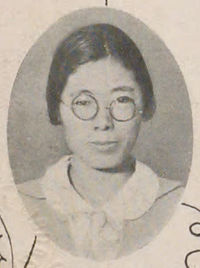Ichikawa Fusae
This string of articles will look at the broader topic of gender discussions in Modern Japan (1920-1940). I will introduce two leading Japanese feminists in the early 20th century who had a lasting impact on Japanese politics, society, and feminists in general all around the world. 'Bluestocking' was the first magazine in Japan to be written, run, and edited by women only and is thus a historical important medium.
The first Japanese feminist I will introduce is Ichikawa Fusae.
 |
| Ichikawa Fusae |
Ichikawa Fusae (1893-1981)
Japanese suffragette, feminist activist, and politician
Ichikawa Fusae was one of the leading feminists in Japan. She had great influence inside Japan but was also known in feminist circles globally. The New York Times wrote an obituary when she died at age 87.She grew up in an abusive household in Ichinomiya, Aichi Prefecture, where she experienced her father hitting her helpless mother.
Her will to rebel against him was set. Moreover, the seed for her determination to fight for women's rights, women being equal to men and not assuming the inferior role, was planted at that time.
 | |||
| Map of Ichinomiya, former Nakashima-gun Meichi-mura (中島郡明地村) where Ichikawa grew up |
But her father was progressive in one field: education. He allowed his children, sons and daughters, to go to school. Ichikawa enjoyed a good education from elementary school to university and graduated from Aichi Prefectural Women's Normal School in 1913.
After that, aged 20, she worked as an elementary school teacher, one of the few 'acceptable' jobs for women at that time, but she had to quit due to poor health.
Ichikawa Fusae the Pioneer
Not satisfied with the limitation of being a teacher, she began to work as the first ever female journalist for the Nagoya Shinbun (now Chunichi Shinbun, 中日新聞) from 1917-1919. Pretty progressive at that time.
 |
| Nagoya Newspaper Office (Network2010) |
She moved to Tokyo to work as a secretary for the women's section of the Yuaikai party (友愛会), where she gained experience in the political arena and got exposed to women's issues. This helped her found the 'New Woman Association' (NWA, 新婦人協会) in 1924 with another leading feminist Hiratsuka Raicho whom I will introduce in the next blog post. The main goal of this association was to get the right for women to vote, achieve political rights for women and to start a discourse on the role of women in society.
 |
| Mori, Ichikawa Fusae Monogatari p. 42 |
To have a greater insight intoIchikawa Fusae's life and achievements, the manga 「市川房枝物語」'The Tale of Ichikawa Fusae' is a great start.
What Ichikawa Fusae fought for
Different from her colleague and co-founder of the NWA, Hiratsuka Raicho, she fought for a more inclusive and expansive “principle of women’s rights (jokenshugi).
She believed that not only mothers had a right to be acknowledged as legitimate citizens, but all women, regardless of her marital status.
By the early 1920s, Ichikawa had come to believe that male-female equality would be the key to political empowerment.
But she was also a controversial figure. She supported the national propaganda on warfare at that time to further her cause for equal rights for women. Until 1952 she was banned from participating in Japanese politics, only when Japan gained full sovereignty back she served 5 terms in the upper house of the Diet up until the 1980s.
She extensively wrote about her beliefs and experiences in the USA that impacted her greatly on her views on feminism.
Some of her influential books are:
- “Atarashiki seiji to fujin no kadai"/新しき政治と婦人の課題 [New Politics and Women’s Challenges]

Restless until the end
Even as a senior she worked relentlessly towards gender equality and ran as an independent in Parliament again in 1974, mainly by the support from young people. She spoke out on matters that were dear to her heart and did not shrink away from discussions, although it might have gotten uncomfortable. A big no-no in Japanese harmonic-centred society, especially for women who were taught to be pleasant and above all and to not cause trouble.
"As long as you don't behave differently from other people, you escape criticism. But if you step up front and advocate some belief, you are bound to be criticized. In fact, one of the characteristics of a leader is that he is criticized."
(Fusae Ichikawa, in Kristen Golden and Barbara Findlen, Remarkable Women of the Twentieth Century ())This short video shows Ichikawa's activism and involvement in political spheres up until her late 80s. The video is in Japanese, but nonetheless, her personality shines through and it gives us a good image of how much she moved the people around her.
Vigorous until the end
Sources:
encyclopedia, Ichikawa Fusae
https://www.encyclopedia.com/women/encyclopedias-almanacs-transcripts-and-maps/ichikawa-fusae-1893-1981
https://prangecollection.wordpress.com/2018/05/15/may-15-ichikawa-fusaes-birthday/
http://quotationsbywomen.com/authorq/35063/
http://network2010.org/article/686
Professor Hopson's Chapter 7 of 'Gender in Modern Japan and Interwar Culture'
Comments
Post a Comment